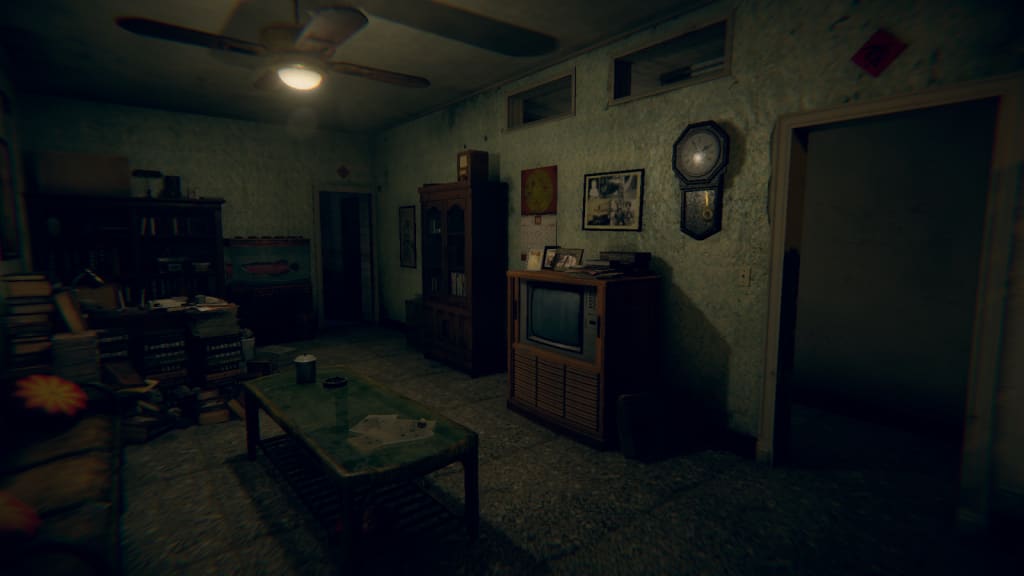REVIEW: Devotion
It is difficult to make art. It doesn't matter if you are making music or painting, all art requires labor

It is difficult to make art. It doesn't matter if you are making music or painting, all art requires labor. Sometimes, that work must be done in love, no matter how difficult it might be. We do the same for our loved ones, even if it causes more pain. Devotionis an interactive game that examines the consequences of these two concepts interacting and the problems that arise from acting out in "love." This is a difficult game to master, not because there are any challenges, but because the themes in the game are complex and heavy.
Devotion was originally released in 2019. However, it was pulled days later due to a controversy involving an e-talisman in the game that Chinese players considered offensive to President Xi Jinping. The game has been available for two years and offers a rare glimpse (for Westerners) into Taiwanese culture through a horror-themed lens.
Devotion is a simple game. The game is essentially a walking simulator with some puzzle elements sprinkled throughout. Du Feng Yu is the main character. The game takes place over three years in 1980s Taiwan. Most of the action takes place in an apartment.
The game centers on Du Feng Yu's personal life. His wife, Gong Li Fang (a retired, successful singer) and their daughter, Du Mei Shin, who is plagued by a mysterious illness. It is not clear if the events that you experience over the three-hour duration are real or if the horror is simply a hook to tell the story. But ultimately, it doesn't matter.
It makes great use of its genre. While there are the standard tropes of jump scares and dimly lit corridors, as well as creepy dolls, the game shines because it uses doors to build tension. I hesitated every time I approached a door that I couldn't open or an entrance to the apartment from a different year. Sometimes, the apartment would change in subtle ways. I didn't know what I was getting into behind every door. The things I was most afraid about were not the horrific, yet terrifying, things that could be in my apartment. It was the changes Du Feng Yu would make, and the impact on his family.
Feng Yu, a poor screenwriter who never succeeds in scriptwriting, is revealed throughout the game. Feng Yu's failures eventually led him to assign stardom to his daughter Mei Shin. Her father encourages her to pursue a singing career. However, she is unable to make much progress due to her illness. Here is where the concept of love gets complicated. You can see Mei Shin through the hole in her apartment wall, and you can see him working at his desk, with scrunched-up paper littering the floor. He refuses to let her play and continues to ignore all of her pleas. Finally, he slams on his desk with his hands and pushes everything to the floor. These moments were more difficult than the traditional horror elements and are truly the most difficult to overcome. This particular moment encapsulates Feng Yu’s inability to balance his love of his work and his love for his daughter, showing just how little he truly understands her.
Hard work is required for love and art. You can see Feng Yu has at least some love for his daughter, as evidenced by the notes found throughout the game. It's evident that he is passionate about his work, as evidenced by his unwavering dedication to it. However, just because you love something or someone does not mean that the actions you take are right.
You learn that Mei Shin suffers from anxiety and panic attacks. This is something you would expect to see now, but it was a different time in the 1980s. Feng Yu is also a member of a cult and gives money to it. He also takes his daughter to see a mentor, a leader/member of the cult who claims she can heal her daughter. It doesn't work. It's a surreal, visceral moment when you, the player, as Feng Yu, make a cut in one of his eyes and then pull out his tongue to serve the fictional god Cigu Guanyin. It was difficult for me to follow through. I didn’t want any more buttons to push, and I didn’t want to do any harm. By doing so, he expresses his "religion" devotion to his daughter and the soul of her failing career by doing so. It also reveals so many things about his view of art and people.
Feng Yu's loss as a father, husband, and creative creator is the theme of this game. It asks what art is worth when people are hurt during its creation. If his daughter is not there, it's worthless. After all, his daughter was something that he created. After I quit the game, I felt just sadness. The ending is not scary, but there's no fear. Feng Yu made a mistake, he destroyed his life and is responsible for the pain that he suffers. He is the one responsible. I, the player, didn't leave the game fearful and adrenaline-fueled, afraid for my life. I left the game empowered in my refusal to cause harm to anyone else for "art", as it will leave me only with solitude.





Comments
There are no comments for this story
Be the first to respond and start the conversation.